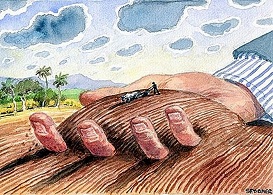End Game in Egypt
On February 3, New York Times writers Helene Cooper and Mark Landler headlined, "White House, Egypt Discuss Plan for Mubarak's Exit," saying:
His administration is "discussing with Egyptian officials a proposal for (Mubarak) to resign immediately and turn over power to a transitional government headed by Vice President Omar Suleiman with the support of the Egyptian military," including Lt. Gen. Sami Enan, armed forces chief, and Field Marshall Mohamed Tantawi, defense minister. [...] The alleged plan includes constitutional reform, a transitional government with opposition groups like the Muslim brotherhood, and "free and fair elections in September." [...] Testifying during a February 3 Senate hearing, senior CIA official Stephanie O'Sullivan said earlier tracking of Cairo instability showed conditions were "untenable," but "we didn't know what the triggering mechanism would be."
On February 4, Times writer David Kirkpatrick headlined, "Egyptian Government Figures Join Protesters," saying:
During Friday protests, "(c)racks in the Egyptian establishment's support for (Mubarak)" emerged with Amr Moussa, Arab League head, and other notable figures appearing on Cairo streets, including defense minister Field Marshal Mohamed Tantawi, the first member of Egypt's ruling elite to do so.



























